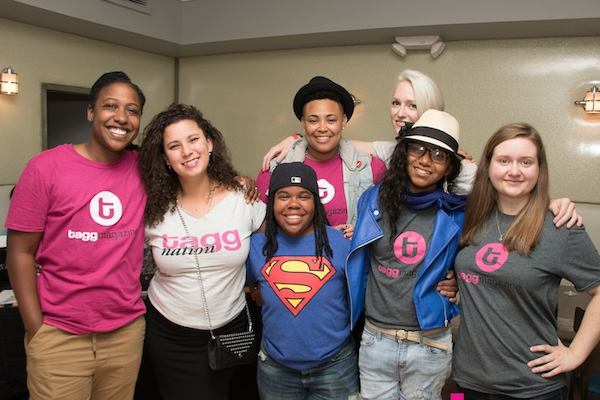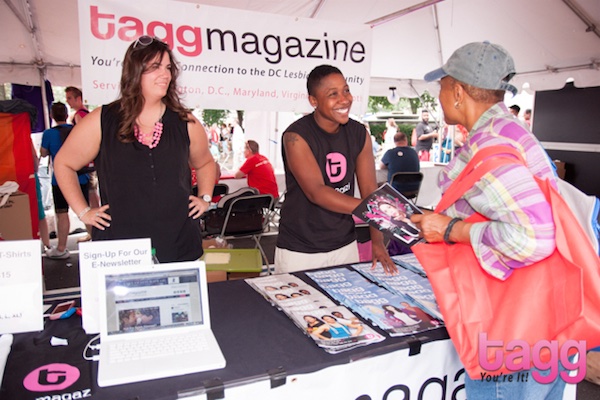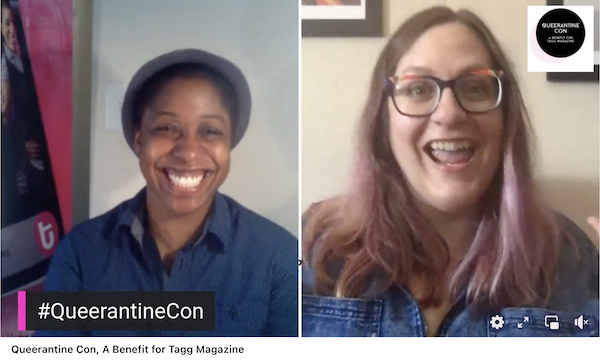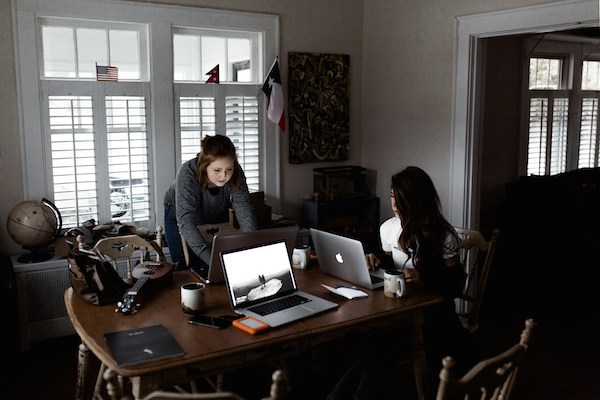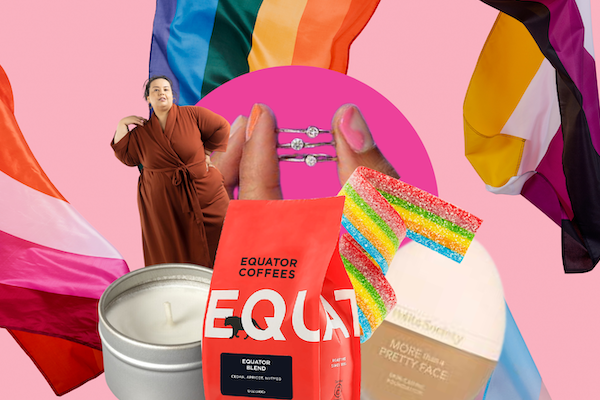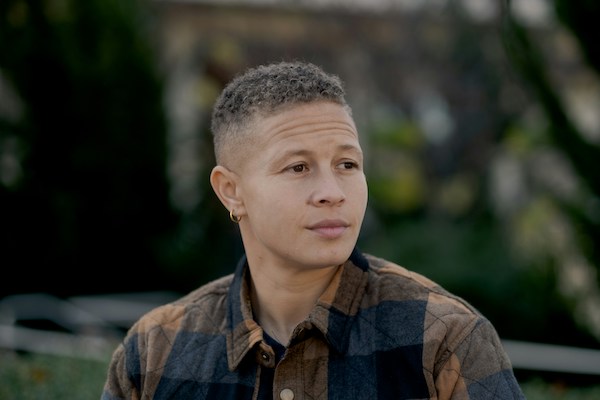
7 Gayest Moments from the 2022 Emmy Awards
September 13, 2022
Lez Hang Out Podcast Ep. 603: Got Gayme? with Dot Marie Jones
September 14, 2022It’s been ten years since Tagg Magazine printed its first issue, giving space to overlooked queer voices and fostering connection in our community. While we’ve all enjoyed seeing our lives and experiences reflected in the magazine’s glossy pages, the story behind the scenes has been one of a journey of incredible ups and downs. For this year’s anniversary issue, Tagg Founder and Editor-in-Chief Eboné Bell pulls back the curtain and takes us along on her journey to build a magazine that’s made a resounding impact on our community.
Before Tagg, Bell remembers going out in Washington, D.C.’s thriving LGBTQ+ scene and noticing that an disproportionate amount of the local LGBTQ+ magazines only catered to gay, white men. “I would see these magazines and ask ‘Where are the queer women? Where are the queer women of color? Where are the people who look like me?’”.
Frustrated by this reality, Bell began to think about how to create a new space specifically designed to serve the queer women of D.C. Around the same time, an acquaintance approached Bell and said, “I can see you running a lesbian magazine.” The two talked about the idea and bolstered by the support, Bell set off to create a new kind of LGBTQ+ magazine.
Getting the magazine off the ground proved to be a labor of love—at one point another media outlet looked like they might house the magazine, but they ghosted Bell at the last minute. Crushed, she considered throwing in the towel, when an unexpected phone call breathed new life into the project. “A woman called me and said, ‘You don’t know me, but I’ve seen your work and I think you would be perfect to run a lesbian magazine.’” Bell recalls. The two decided to work together to create the blossoming magazine.
Bell’s vision was finally on the way to being realized. However, before the magazine could enter the world, she had to decide what to call it. “There were three goals with the magazine: To tell the stories of LGBTQ+ women, to provide safe spaces and events where people could meet, and to provide resources to the community,” Bell explains. Connection was the thread linking all three goals, and it was important to reflect that in the title. It finally clicked when Bell thought back to the schoolyard game of tag. “When you play tag, you have to reach out and touch someone,” she says. Happy with the new name, Bell added an extra ‘g’ to the title, ensuring that Tagg would always stand out.
In September 2012, the first issue of Tagg Magazine flooded the streets of Washington, D.C., Maryland, and Virginia. The tagline read, “Your connection to the DC-area lesbian community.” However, fans of the magazine began to reach out, saying, “I love Tagg, but I don’t identify as a lesbian.” Having started Tagg due to a lack of inclusivity in the LGBTQ+ community, Bell took the feedback to heart. By the end of their second year in publication, the magazine had a new tagline: “Everything lesbian, queer, and under the rainbow.”
Listening to everyone involved in Tagg—readers, writers, advertisers—became a key aspect of Bell’s leadership as the magazine continued to grow. When it launched, Tagg was a free local magazine that could be found at queer bars and libraries. The magazine earned revenue from ad sales, subscriptions, events, and merchandise sales. Soon, subscribers from outside of the D.C. metropolitan area began to write in about the impact Tagg had on their lives despite the magazine’s local focus. “The reality was that bars and pubs catering to queer women were shutting down across the country,” Bell says. To help combat that loss, she made the decision to take the magazine national.
Tagg flourished within the LGBTQ+ community, and in 2015 the magazine added the Tagg Nation podcast to its offerings. Designed to further amplify the voices of queer women, the podcast covered everything from trending topics on the website to current events in the LGBTQ+ community.
In 2019, the podcast ended as the hosts moved on to new opportunities. However, the connection fostered by Tagg Nation was invaluable. Intent on continuing supporting queer voices, Bell looked for an existing podcast to acquire. Later that year, Lez Hang Out—a biweekly podcast—joined the Tagg family.
Like so many other businesses, Tagg hit a speed bump in March 2020. Every year, the magazine puts on a reception to celebrate the women featured in the annual Enterprising Women issue. It’s an opportunity for queer community leaders to connect, break bread, and be recognized for the work they do. However, as news of COVID-19 spread through the country, Bell made the difficult decision to cancel the 2020 reception.
Suddenly events—Tagg’s second highest revenue generator behind ads—were indefinitely postponed. And with so many bars, bands, and clubs among Tagg’s advertisers, the magazine lost 50 percent of its advertisers seemingly overnight. For the first time since Tagg’s inception, Bell decided to skip an issue. The future of Tagg was on the line.
“Panic started to sink in at this point,” Bell remembers. Her mental health began to take a toll as the financial reality of saving the magazine came into question. “Failure is my biggest fear. I was scared I’d look like a failure. I’d look stupid. I wondered, ‘Why did I do this?’” Bell says. Fortunately, Bell wasn’t alone: Friends and family reminded her of her journey so far, and of all the things she had accomplished in seven years of running Tagg.
“I prayed about it,” Bell says. “I started to get more and more comfortable with the fact that Tagg might shut down and that there was nothing I’d done wrong if that happened.” At the same time, she made the decision to do everything she could before calling it quits.
Bell and the Tagg team pulled out all the stops: They asked the community for help, hosted Queerantine Con (a virtual fundraiser featuring DJs, bartenders, celebs, and panels,) and sold limited-edition items through the Tagg shop. Subscriptions doubled and, as the Black Lives Matter movement reignited, people jumped in to support Tagg as a Black-owned media company.
“We made it through the pandemic because of our community,” Bell says. Tagg staff member Becca Damante spearheaded the acquisition of special items for the shop. Celebs, authors, and leaders who participated in the fundraisers gave their time and support free of charge. The community that Bell spent years fostering showed up when the magazine needed them most, ensuring that Tagg wouldn’t be another casualty of the pandemic.
Two years later, the magazine is thriving. Despite the setbacks caused by the pandemic, Tagg has continued to expand. Bell recently hired Tagg‘s first Assistant Editor, Sarah Prager, and web traffic has increased by thirty percent with her leadership.
“I have the best team I’ve ever had at this point,” Bell says. She is mindful about hiring people who compliment her weaknesses and want to see the magazine succeed as much as she does. “I’d be lost without my team,” she says. From here, Bell would love to grow the team further, increasing Tagg’s brand and reach.
Thinking about all that she and Tagg have survived thus far, Bell is optimistic about the magazine’s future. “My hope for the future of Tagg is that we get to do this for another ten years,” she says.


